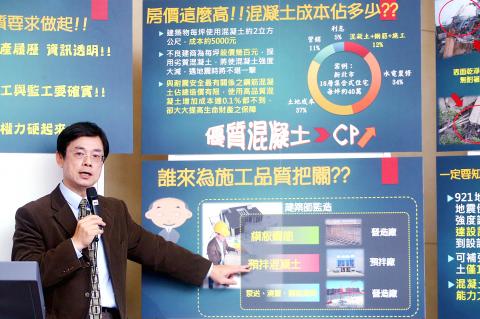Weak, watered-down concrete was likely used in the Weiguan Jinlong complex that collapsed in the Feb. 6 earthquake, academics and industrial representatives said yesterday, calling on the Ministry of Interior’s Construction and Planning Agency to randomly sample the concrete used in major construction projects to deter such practices.
The Taiwan Concrete Institute and Taiwan Ready-mixed Concrete Industry Association held a news conference at National Taiwan University (NTU) to call for regulatory reform.
Chan Yin-wen (詹穎雯), a professor of civil engineering at the university and the institute’s executive director, said that while some media reports on the complex’s collapse focused solely on possible problems with its steel beams, photographs taken at the site suggest that weak, watered-down concrete was also a factor in the building’s collapse.

Photo: CNA
The collapse of the 17-story complex in Tainan’s Yongkang District (永康) caused 115 deaths, as one more body was found yesterday, and was the largest source of casualties in the magnitude 6.4 earthquake.
“The exterior of the broken steel beams [found in the rubble] are smooth and have very little concrete attached to their surface. This shows that the concrete used in the building’s construction was not strong enough to effectively reinforce the steel beams when the earthquake struck, causing them to snap,” Chan said, adding that another factor that might have contributed to the collapse could be the use of too little concrete.
While an official examination of the building is ongoing, an academic survey of more than 1,000 buildings damaged in the 921 Earthquake in 1999 found that the quality of concrete was directly related to damage, Chan said, adding that concrete in 88 percent of the damaged buildings surveyed in 1999 failed to meet regulatory standards.
Price competition, combined with poor accountability, encourages developers to take shortcuts, such as watering down concrete to cut costs and make pouring easier, he said.
“The responsibility of architects to supervise construction has not been realized because it is unclear and no authority enforces the standards. After a developer constructs and sells a building, they can be cleared of any responsibility if they change their company’s name and keep on building through other means,” he said.
“The problem is that while they might be saving several hundred New Taiwan dollars per ping [3.3 m2], they are endangering a consumer value of up to NT$50,000 per ping [for houses in Taipei and New Taipei City],” he said.
The institute and the association recommended the Construction and Planning Agency conduct random sampling of the concrete used in major construction projects and publicize any sub-standard results along with other projects that had been developed by the company.
Companies caught cheating would find it difficult to sell properties in completed buildings, making them think twice before taking shortcuts, Chan said, adding that use of sub-standard materials in public construction projects dropped sharply after random sampling was introduced.
The institute and association also recommended that “production resumes” for concrete used for buildings be compiled and publicized, as well as amendments made to the Building Act (建築法) to clarify responsibility for supervision and quality control of construction projects.

Three batches of banana sauce imported from the Philippines were intercepted at the border after they were found to contain the banned industrial dye Orange G, the Food and Drug Administration (FDA) said yesterday. From today through Sept. 2 next year, all seasoning sauces from the Philippines are to be subject to the FDA’s strictest border inspection, meaning 100 percent testing for illegal dyes before entry is allowed, it said in a statement. Orange G is an industrial coloring agent that is not permitted for food use in Taiwan or internationally, said Cheng Wei-chih (鄭維智), head of the FDA’s Northern Center for

LOOKING NORTH: The base would enhance the military’s awareness of activities in the Bashi Channel, which China Coast Guard ships have been frequenting, an expert said The Philippine Navy on Thursday last week inaugurated a forward operating base in the country’s northern most province of Batanes, which at 185km from Taiwan would be strategically important in a military conflict in the Taiwan Strait. The Philippine Daily Inquirer quoted Northern Luzon Command Commander Lieutenant General Fernyl Buca as saying that the base in Mahatao would bolster the country’s northern defenses and response capabilities. The base is also a response to the “irregular presence this month of armed” of China Coast Guard vessels frequenting the Bashi Channel in the Luzon Strait just south of Taiwan, the paper reported, citing a

A total lunar eclipse, an astronomical event often referred to as a “blood moon,” would be visible to sky watchers in Taiwan starting just before midnight on Sunday night, the Taipei Astronomical Museum said. The phenomenon is also called “blood moon” due to the reddish-orange hue it takes on as the Earth passes directly between the sun and the moon, completely blocking direct sunlight from reaching the lunar surface. The only light is refracted by the Earth’s atmosphere, and its red wavelengths are bent toward the moon, illuminating it in a dramatic crimson light. Describing the event as the most important astronomical phenomenon

UNDER PRESSURE: The report cited numerous events that have happened this year to show increased coercion from China, such as military drills and legal threats The Chinese Communist Party (CCP) aims to reinforce its “one China” principle and the idea that Taiwan belongs to the People’s Republic of China by hosting celebratory events this year for the 80th anniversary of the end of World War II, the “retrocession” of Taiwan and the establishment of the UN, the Mainland Affairs Council (MAC) said in its latest report to the Legislative Yuan. Taking advantage of the significant anniversaries, Chinese officials are attempting to assert China’s sovereignty over Taiwan through interviews with international news media and cross-strait exchange events, the report said. Beijing intends to reinforce its “one China” principle